As a family photographer, I had several reasons to look for Mylio alternatives. Although this program has AI search functionality, it is not as sophisticated as the toolkit offered by Adobe Bridge, Apple Photos, or Google Photos.
So, using Mylio, I often dealt with odd search results, which added complexities to my workflow. Besides, when doing my job, I needed to remove duplicates using another software, which was not very convenient.
Furthermore, Mylio Photos is troublesome to install, and its editing toolkit is restricted, so it is not suitable for performing complex edits. The lack of such advanced features as comprehensive metadata management and trouble-free integration with other editors also disappointed me, as I hoped to streamline my daily routine with their help.
When looking for photo-organizing software, I paid attention to the following aspects:
★★★★★ (5/5)
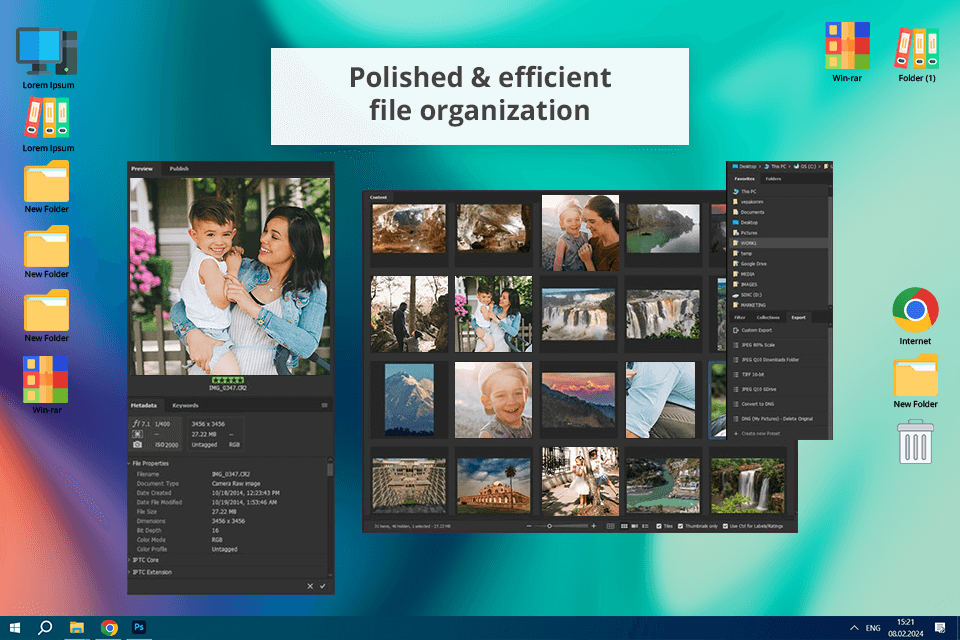
Pricing: Free
Compatibility: Windows, macOS
Both Adobe Bridge and Mylio have amazing tools for organizing photos. They also excel in image categorization and search functionality by supporting keyword tagging, ratings, and collections. As for me, the most outstanding features of the Adobe product are its ability to integrate with other well-known tools like Photoshop and Lightroom, excellent batch processing mode, great metadata management capabilities customizable workspaces, content import/export, and collaboration tools.
Thanks to the advanced filtering of this program, I managed to sort 500 RAW files during a family photo session in a flash. When processing even photography, I benefited from its handy batch processing mode, which is an absolute time-saver. And its comprehensive metadata was crucial for archiving purposes, letting me organize older projects worry-free.
This free photo organizing software provides multiple metadata editing options. This Mylio Photos alternative keeps all the essential metadata like the data of a photo shoot, location, and client info. I also like that the program allows generating and saving custom workspaces.
★★★★☆ (4.5/5)
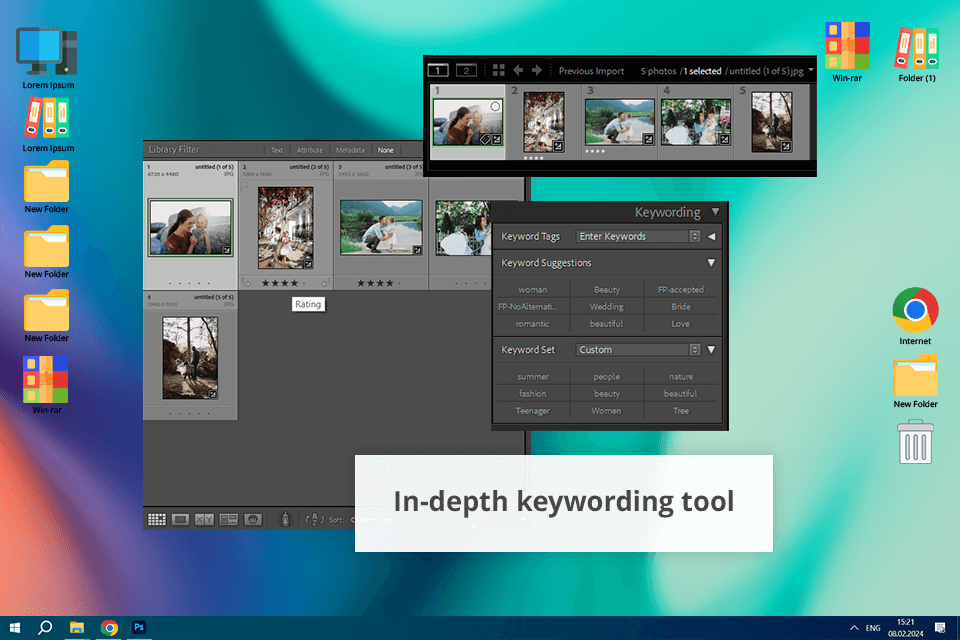
Pricing: 7-day free trial, then $9.99/mo
Compatibility: Web, Windows, MacOS, iOS, Android
Both Lightroom and Mylio support a wide range of options for organizing photos like keyword tagging, metadata support, color codes, flags, and star ratings. However, such a comprehensive functionality and complex UI make Lightroom a suitable option for pro-level users, whereas Mylo is a more novice-friendly solution.
The main selling point of Adobe Lightroom is its integrated approach, combining photo management and editing functionality, which makes picture processing more efficient. Other features that streamlined my workflow were user-friendly importing, comprehensive tagging, a rating system, batch renaming option, as well as trouble-free exporting. Besides, the program offers secure cloud storage for accessing files from virtually anywhere and keeping them in safety.
For example, I took advantage of the program’s efficient classification system to organize more than 600 RAW files from my latest family photoshoot in no time. Conveniently, I could even access all the images while being on the go, and the ability to rename multiple photos at once came in handy as well.
★★★★☆ (4.5/5)
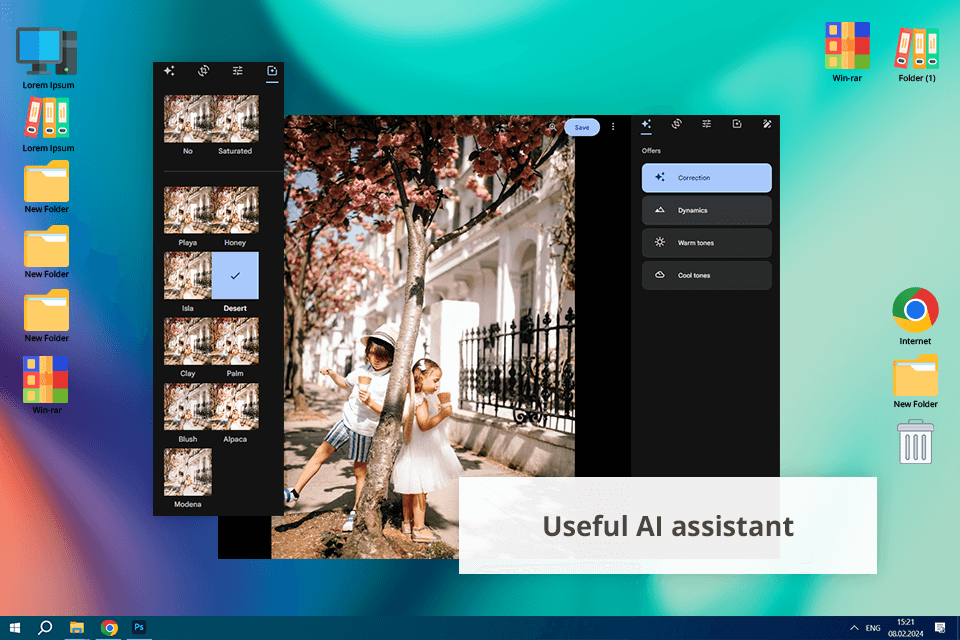
Pricing: Free (15 GB), $1.99/mo for 100GB
Compatibility: Web, Windows, iOS, Android
Google Photos is a great Mylio Photos alternative, which is similar to the competitor in many aspects. Both tools allow storing, organizing, and viewing digital files efficiently, as well as offer an excellent set of features for organizing files like tagging and categorization.
Both solutions are perfect for storing and syncing photos. However, Google Photos cannot perform all these operations without an internet connection, whereas Mylio can work offline and provides cloud-independent storage options.
As for me, Google Photos is a more intuitive tool, which perfectly suits my needs as a family photographer. This photo catalog software also stands out thanks to its AI-powered toolkit. Searching for photos is as easy as typing in their descriptions to let the program define relevant images in a flash. This feature is a real-time-saver, especially when working with multiple images at once.
Conveniently, Google Photos integrates with other Google services like Google Drive and Google Assistant, which is a real bonus. Another option I highly appreciate is its backup and sync tool, which creates the reserved copies of the image folder automatically and the AI suggests, which photos should be sent to the archive.
★★★★☆ (4/5)
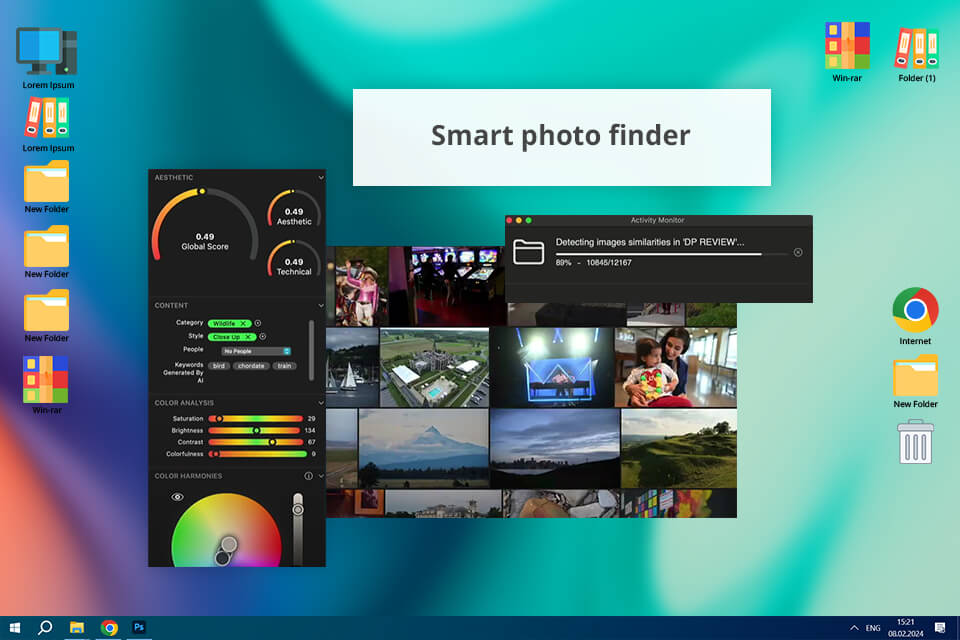
Pricing: 7-day free trial, then from $11,99/mo
Compatibility: MacOS
Like Mylio, Peakto provides a centralized solution for managing photos from different sources, offering a range of organizational features and intuitive UI. However, Peakto offers other advanced options such as Smart Photo Finder, conversational search, and wider compatibility with third-party photo editors.
Peakto turned the daily photo managing routine into a hassle-free task. Using it, I can easily categorize similar pics, enhance them with presets, and access comprehensive metadata including the type of lens, ISO settings, etc. With this photo management software for Mac, it is easy to control all my images no matter whether they are stored in folders or stored in photo editing apps like Apple Photos, Pixelmator, or even Instagram.
Mylio comes with handy facial recognition and geotagging features but its integration with third-party tools is limited. Besides, Peakto excels Mylio with its powerful AI functionality. I benefited from Peakto’s integration with FotoMagico to create my portfolio. Enhancing the resulting slideshow with smooth transitions and catchy titles was a piece of cake.
★★★★☆ (4/5)
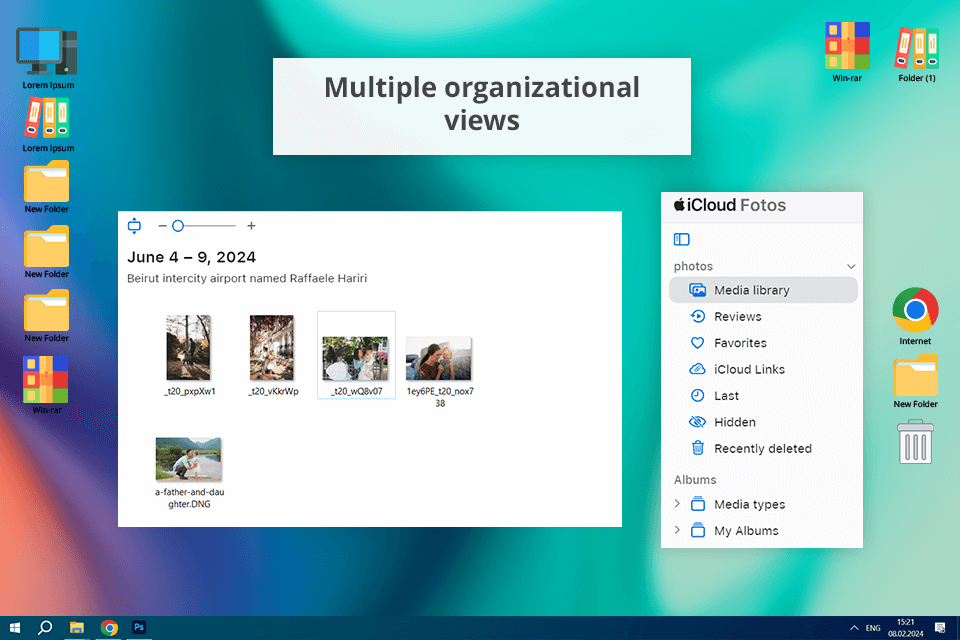
Pricing: Free (for 5 GB) or $0.99/mo for 50 GB
Compatibility: iOS only
Apple Photos and Mylio provide photographers with amazing image organization features. There are options for creating albums, tagging photos, and identifying people with facial recognition. Both services are equipped with tools for cropping pics, adjusting their exposure, and enhancing them with filters.
Apple Photos is a more straightforward solution, but its evolving UI can confuse some users. In its turn, Mylio’s extensive toolkit is quite difficult to learn. As an experienced user of Apple devices, I had no trouble working with the program either on my iPhone, iPad, or Mac. Besides, with this program, my workflow became smoother and faster thanks to automated synchronization and edits.
The Memories feature is another great plus offered by this Mylio Photos alternative. It manages collections of photos and videos, producing amazing slideshows of family events. For instance, once our family vacation came to an end, I organized my photos in albums, tagging each family member they featured, whereas the facial recognition function grouped all images automatically.
★★★★☆ (4.5/5)
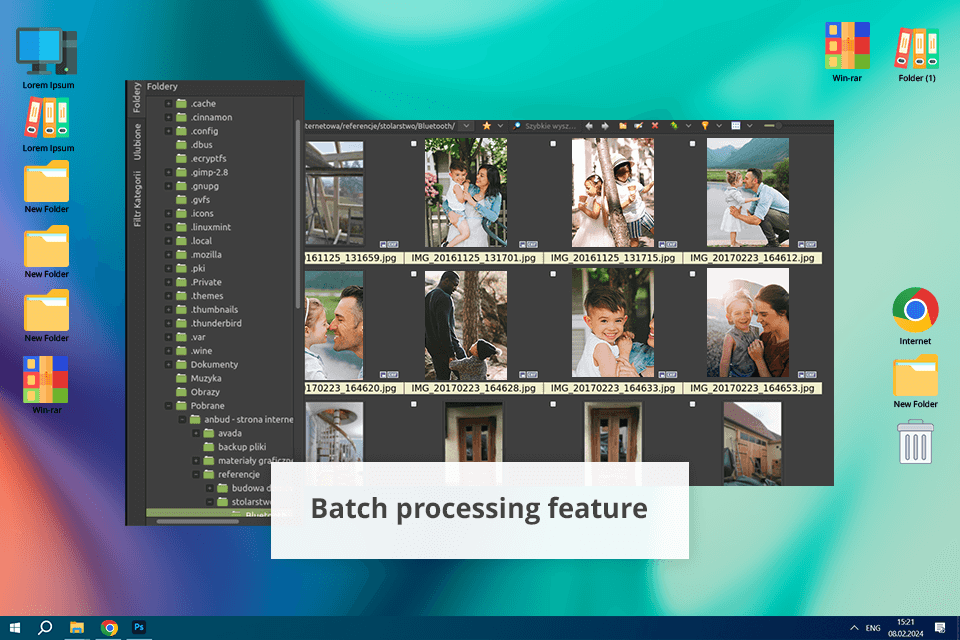
Pricing: From $31/license
Compatibility: Windows, MacOS, and Linux
Although both XnView MP and Mylio have intuitive UIs, they are slightly different in that the first option has a sleek and up-to-date layout, whereas the second one has a more classic and straightforward design. Both services are easy to navigate and allow managing and organizing massive photo collections effortlessly.
XnView MP is popular among photographers because it is fast and lightweight. Handling large image collections with this tool is a breeze, and the computer does not lag or freeze when the program is running. My favorite feature of this Mylio Photos alternative is its helpful batch-processing mode. Working in this batch photo editor, one can apply the same edits or organizational changes to many files at once, streamlining the workflow.
XnView MP works with all common image formats, which cannot be said about Mylio. When working on some projects, I needed to deal with a mix of JPEGs, RAW files, and even some old BMP photos, and this photo viewer coped with the job perfectly.
★★★★☆ (4/5)
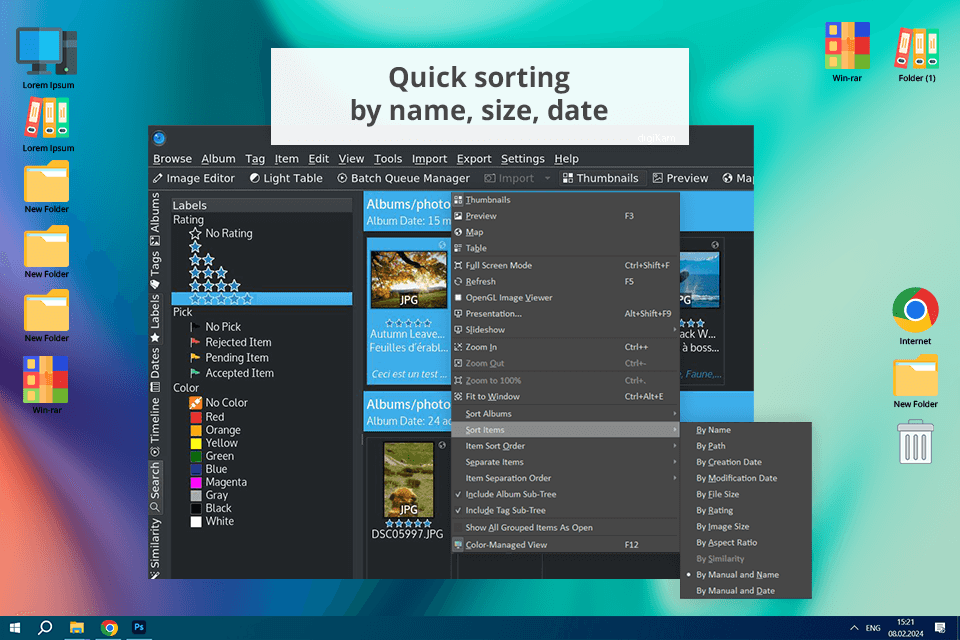
Pricing: Free
Compatibility: Linux, Windows, macOS
DigiKam may attract pro-level users with the advanced functionality, but novices will definitely find its UI cluttered and the available range of features overwhelming. In contrast, Mylio’s UI is more straightforward and designed with newcomers in mind.
Even if your image libraries are stuffed and contain more than 100,000 images, DigiKam will become your handy assistant. All pics uploaded to the platform are divided into albums and subdivided into catalogs. The system sorts these albums by their catalogs, names, and dates.
The tool stands out with its advanced tagging and metadata management functionality. For any family photographer, the ability to tag pics or add metadata is pivotal. By adding such tags as “birthday," "vacation," or "family reunion," to my shots, I make the search and organization of my collection much easier.
★★★★☆ (4/5)
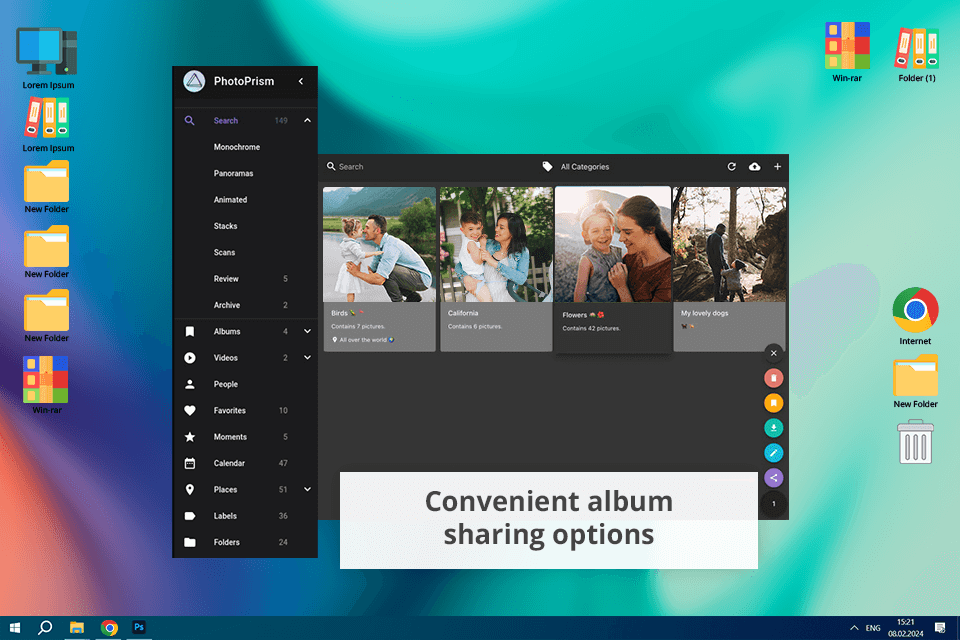
Pricing: Free (only admin account role) or from $2.20/mo
Compatibility: Mac, Linux, Windows, iOS & Android
As for me, PhotoPrism and Mylio are similar in many aspects: both tools support various formats, are fitted with facial recognition options, and offer decent search capabilities. However, PhotoPrism outperforms the competitor in multiple aspects as well. The program supports high-resolution world maps to better capture your memorable moments, shares albums via a secret link with ease, offers advanced metadata extractions, as well as supports Google Photos JSON files.
Although Mylio can manage RAW files and metadata, PhotoPrism offers fantastic handling and detailed extraction capabilities, which make the tool one of the top-notch options available on the market today. The maps feature allows for visualization the past vacations, adding an emotional touch to the photo management routine.
I benefited from the program’s metadata extraction to speed things up while processing a series of photos by learning the camera settings and locations in an instant. In addition, this digital asset management software for photographers offers indexing, viewing, and converting functionality, which allows handling image and video files of most popular formats.
★★★★☆ (4/5)
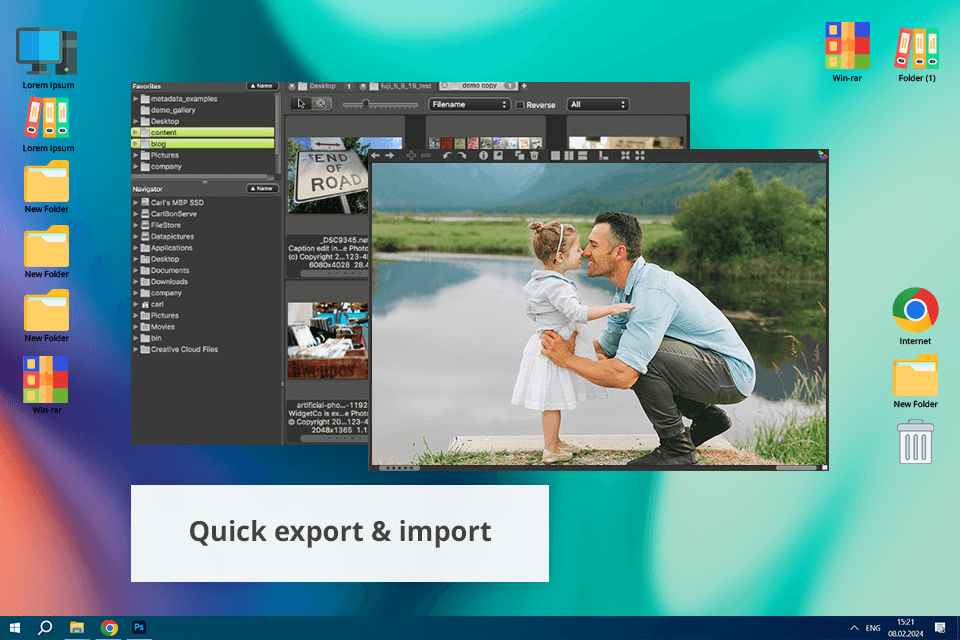
Pricing: 14-day free trial or from $17,99/mo
Compatibility: macOS or Windows
Photo Mechanic is an impressive Mylio Photos alternative, which boasts an amazingly high speed of importing and exporting files, which is pivotal for busy photographers. Compared to Mylio, Photo Mechanic excels in navigating and managing massive collections of images more effectively.
Handling metadata efficiently, I managed to search and organize large photo collections quickly and easily. Although the UI should be updated, it is intuitive and familiar. Sorting and picking the most successful images from a shoot was a piece of cake. Family photographers like me will definitely appreciate the ability to add tags and ratings to images when culling, as it simplifies photo retrieval and selection for family photo albums.
To identify the best Mylio Photos alternatives, you should decide on features and functions that are more essential for you. Here are my 3 favorite options.